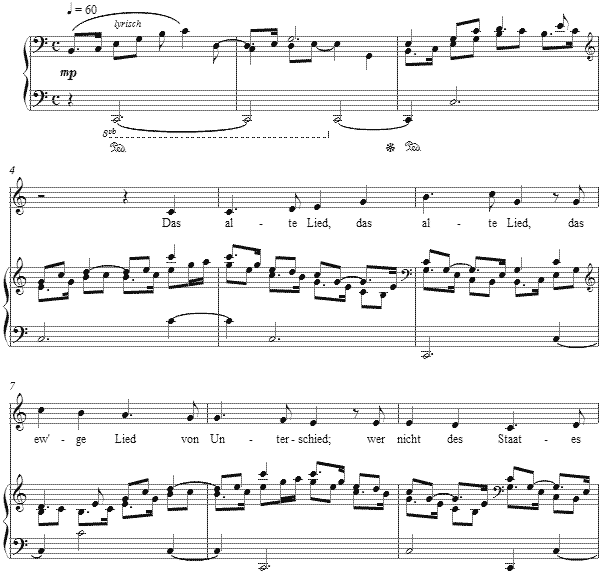Music and Texts of GARY BACHLUND
Vocal Music | Piano | Organ | Chamber Music | Orchestral | Articles and Commentary | Poems and Stories | Miscellany | FAQs
Das alte Lied - (2009)
August Heinrich Hoffmann von Fallersleben
for medium or low voice and piano
Das alte Lied, das alte Lied,
Das ew'ge Lied vom Unterschied:
Wer nicht des Staates Glauben hat,
An den auch glaubet nicht der Staat.
Du ewig Lied vom Unterschied,
Du altes unausstehlich Lied!
Wann beugt doch Engel, Mensch und Vieh
Vor Einem einz'gen Gott das Knie?[ 2 pages, circa 1' 45" ]
Hoffmann von Fallersleben
The old song, that old song,
The eternal unchanging song:
Who does not accept authority's faith
Does not believe in authority.
You eternal unchanging song,
You old, unbearable song!
When will angels, men and creatures
Bow before the eternal God as One?
paraphrase by GB
The text is drawn from the poet's Unpolitische Lieder von Hoffmann von Fallersleben, volume 1, Hamburg 1841, in which his "apolitical" poems are sometimes decidedly political. In response to the German federal government's act of 8 June 1815, specifically Article 16 which sought to restrict local and regional Christian political parties from making individual laws regarding the local populace and German political rights, Fallersleben penned this verse.
His stance remains the significant sticking point in modern politics, in which "authority" becomes the state rather than a reliance of that same "greater power" to which not only religions point but programs like Alcoholics Anonymous as well. The question remains pertinent, for it is essentially answered by one of two alternatives: Moral authority comes from the state and man as led by the state or from that "higher power." Fallersleben opts for the "One," as do I, while others work diligently to establish man as the greater power, without success but with great brutality which has been repeated historically by those political philosophies which target religious belief as a delusion while not recognizing that supplanting "belief" with "belief in the state" is as much a delusion as any. Given the history of the federal state since 1841 -- the date of this text -- Germany has been a rich example of how federal authority can slip the reins of morality in favor of the politically correct coercion which so easily comes without reference to an authority. Fallersleben suggests that such as "authority" as he recommends can never come from the state. In a century and a half since, his argument bears the witness of history.
The two stanzas are treated as two verses of a lyrical hymn. Underlying the vocal line, the accompaniment moves in two upper voices over the pedal tonic throughout, such that there is no harmonic progression of which to speak. Rather, underling the vocal line is a repetition of arches rising and falling like waves without harmonic changes except as perceived by the listener.
The score is available as a free PDF download, though any major commercial performance or recording of the work is prohibited without prior arrangement with the composer. Click on the graphic below for this piano-vocal score.

